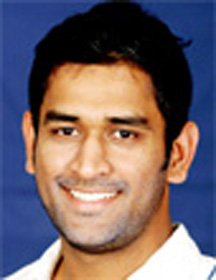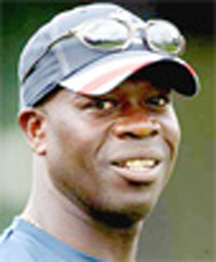T20 World Cup…..
If confirmation was needed that Ottis Gibson was simply stating the obvious in his assessment of the fourth World Twenty20 that starts in Sri Lanka on Tuesday it has been indisputably provided over the past few weeks.
“On the day, if everybody executes well, anybody can win a match,” the West Indies coach said on arrival in Colombo. “We have seen it before. In this format, anything is possible.”
Anything is possible, indeed. The limitations of an innings to 20 overs and bowlers to a maximum of four make it the most unpredictable of the three versions of this unpredictable game.

The lead-up to the Sri Lanka tournament, the fourth since the first in South Africa in 2007, have offered some extreme examples. Even if some have been from unofficial pre-tournament warm-up matches in Sri Lanka, no one ever appreciates having to explain such losses with shallow comments about the “positives”.
Australia crumbled to 89 all out and lost the first of their three official matches to Pakistan in the UAE by seven wickets last month; a few days later, they returned the embarrassment, routing Pakistan for 74, their lowest T20 International total, and winning by 86 runs, the Test equivalent of an innings and a thousand.
England, South Africa, India, New Zealand and the West Indies have all gone through similar convulsions.

At the tail-end of their recent Test and ODI series, England could only scrape 118 for seven from their 20 overs in the first T20 match against South Africa who breezed home by seven wickets. By the third, England were blasting 118 for five from the rain-shortened 11 overs and comfortably squaring the series.
The Indians had no problem beating Sri Lanka by 39 runs in an official, one-off T20 in Sri Lanka last month or by 26 runs in one of yesterday’s warm-ups in Colombo. Yet they lost by one run at home in Chennai a week earlier to New Zealand who, conversely, collapsed to 83 all out and defeat by 56 runs to Australia in their tournament warm-up yesterday.
The West Indies arrived in Colombo with high expectations, widely, and riskily, referred to as one of the favourites, primarily because of the presence in their 15 of several stars from the Indian Premier League (IPL) and Australia’s Big Bash.

They had brushed aside New Zealand in their two previous T20 Internationals in Florida 10 weeks earlier, were properly prepared at a week-long camp in Barbados but, giving captain Darren Sammy and main man Chris Gayle the time off, promptly succumbed to Sri Lanka by a one-sided nine wickets.
So, yes, on the day, or more precisely, for 40 overs, “anybody can win a match”. It is far different over five days or even 100 overs.
On the surface, India captain MS Dhoni’s assertion that one special, individual performance can decide a T20 seems reasonable enough. West Indians know better from disheartening experience, mainly involving Gayle.
On the day (there’s that term again), Gayle is the most explosive batsman in T20 cricket. While his phenomenal six-hitting for a multitude of franchise teams around the world make him arguably the most feared opponent over the coming three weeks, he cannot win matches on his own.
The powerful Jamaican set off the inaugural tournament in South Africa in 2007 with a typically devastating assault for 117 off 57 balls with seven sixes and 10 fours in the opening match against the hosts. It gave the West Indies a total of 205 for six. Surely, they could not lose – but they did, with 2.2 overs to spare. There were 23 wides among 28 extras.

In the second tournament, two years later in England, the West Indies needed 159 to beat Sri Lanka in the semi-final. They lasted 17.4 overs for 101, Gayle batting through the innings for 63 while not another batsman reached double figures.
At Kensington Oval in the last tournament in 2010, Gayle’s 98 underpinned the West Indies 169 for six against India. At least, he was then backed up by the bowlers and they won that one.
T20 cricket has developed in its short life span from the originally held notion that it was simply all meaningless vupping to a game that “still revolves around strong basics” as Gibson and other coaches have come to appreciate. It also became clear that it is as much a team game as the other forms.
Every coach would have long since established his plans. They would do worse than to examine the template set by England in their 2010 triumph in the Caribbean.
It had everything to do with constant selection. Even after a shaky start, losing to the West Indies through the Duckworth/Lewis method and gaining the necessary points to advance from a rained-out match against Ireland in Guyana, their 11 changed only once and that was to allow Kevi Pietersen’s return to be with his wife for the birth of their first child.
It meant a settled order, batting and bowling. England were not once bowled out and only twice did they call on more than the five necessary bowlers – and then only for a solitary over. Their confidence rose conspicuously with every match. The same had been true of the consistent West Indies in the triumphant 1975 and 1979 World Cups.
In this case, it is easier said than done.
Six of the squad of 15 chosen either as all-rounders or bowlers (Ravi Rampaul, Andre Russell, Kieron Pollard, Marlon Samuels, Dwayne Bravo and Fidel Edwards) carry a high economy rate of over eight runs an over in T20 Internationals. Australia, England, India and Bangladesh, for instance, have only two. (Sunil Narine, 6.40, and Sammy, 6.47, are the only West Indians below seven per over).
It is clearly a dilemma to be presumably determined mainly by conditions on the ground in Sri Lanka. Yet. unless someone gets an almighty pounding early, stats indicate sticking to five bowlers for the 20 overs.
So who for the Cup at the end?
On the established premise that, on the day, anybody can win a match, anybody can be champions. And it doesn’t really matter how many IPL players are in the team because they are in others as well.





